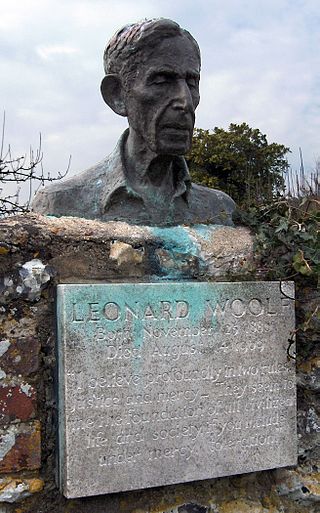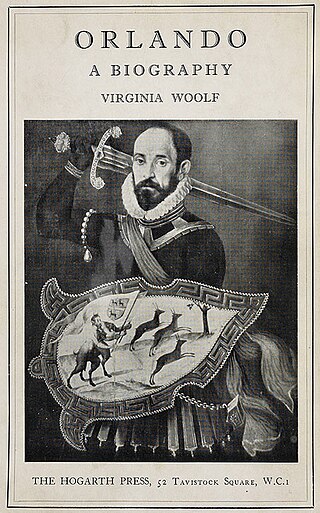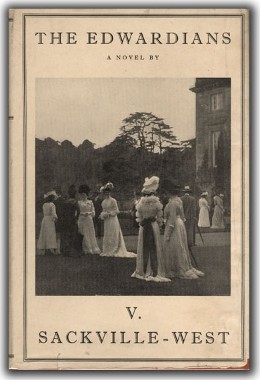
Adeline Virginia Woolf was an English writer. She is considered one of the most important modernist 20th-century authors. She pioneered the use of stream of consciousness as a narrative device.

Leonard Sidney Woolf was a British political theorist, author, publisher, and civil servant. He was married to author Virginia Woolf. As a member of the Labour Party and the Fabian Society, Woolf was an avid publisher of his own work and his wife's novels. A writer himself, Woolf created nineteen individual works and wrote six autobiographies. Leonard and Virginia did not have any children.

Victoria Mary, Lady Nicolson, CH, usually known as Vita Sackville-West, was an English author and garden designer.

Sissinghurst Castle Garden, at Sissinghurst in the Weald of Kent in England, was created by Vita Sackville-West, poet and writer, and her husband Harold Nicolson, author and diplomat. It is among the most famous gardens in England and is designated Grade I on Historic England's register of historic parks and gardens. It was bought by Sackville-West in 1930, and over the next thirty years, working with, and later succeeded by, a series of notable head gardeners, she and Nicolson transformed a farmstead of "squalor and slovenly disorder" into one of the world's most influential gardens. Following Sackville-West's death in 1962, the estate was donated to the National Trust. It was ranked 42nd on the list of the Trust's most-visited sites in the 2021–2022 season, with over 150,000 visitors.

Violet Trefusis was an English socialite and author. She is chiefly remembered for her lengthy affair with the writer Vita Sackville-West that both women continued after their respective marriages. It was featured in novels by both parties; in Virginia Woolf's novel Orlando: A Biography; and in many letters and memoirs of the period roughly from 1912 to 1922. She may have been the inspiration for aspects of the character Lady Montdore in Nancy Mitford's Love in a Cold Climate and of Muriel in Harold Acton's The Soul's Gymnasium (1982).

Orlando: A Biography is a novel by Virginia Woolf, first published on 11 October 1928. Inspired by the tumultuous family history of the aristocratic poet and novelist Vita Sackville-West, Woolf's lover and close friend, it is arguably one of her most popular novels; Orlando is a history of English literature in satiric form. The book describes the adventures of a poet who changes sex from man to woman and lives for centuries, meeting the key figures of English literary history. Considered a feminist classic, the book has been written about extensively by scholars of women's writing and gender and transgender studies.

A love letter is an expression of love in written form. However delivered, the letter may be anything from a short and simple message of love to a lengthy explanation and description of feelings.

Nigel Nicolson was an English writer, publisher and politician.

Portrait of a Marriage: Vita Sackville-West and Harold Nicolson is the 1973 biography of writer and gardener Vita Sackville-West compiled by her son Nigel Nicolson from her journals and letters.

Monk's House is a 16th-century weatherboarded cottage in the village of Rodmell, three miles (4.8 km) south of Lewes, East Sussex, England. The writer Virginia Woolf and her husband, the political activist, journalist and editor Leonard Woolf, bought the house by auction at the White Hart Hotel, Lewes, on 1 July 1919 for 700 pounds, and received there many visitors connected to the Bloomsbury Group, including T. S. Eliot, E. M. Forster, Roger Fry and Lytton Strachey. The purchase is described in detail in her Diary, vol. 1, pp. 286–8.
Jane Marcus (1938–2015) was a pioneering feminist literary scholar, specializing in women writers of the Modernist era, but especially in the social and political context of their writings. Focusing on Virginia Woolf, Rebecca West, and Nancy Cunard, among many others, she devised groundbreaking analyses of Woolf's writings, upending a generation of criticism that ignored feminist, pacifist, and socialist themes in much of Woolf's work and critique of imperialism and bourgeois society. Marcus's understanding of Woolf's place within the larger context of English literature has become prevailing wisdom today in the fields affected by her theorization and research, despite the controversial nature of her positions when they were originally formulated and how much opposition she garnered from earlier scholars and critics.
Victoria Glendinning is a British biographer, critic, broadcaster and novelist. She is an honorary vice-president of English PEN and vice-president of the Royal Society of Literature. She won the James Tait Black Memorial Prize and the Whitbread Prize for biography.

The Edwardians (1930) is one of Vita Sackville-West's later novels and a clear critique of the Edwardian aristocratic society as well as a reflection of her own childhood experiences. It belongs to the genre of the Bildungsroman and describes the development of the main character Sebastian within his social world, in this case the aristocracy of the early 20th century.
“I ... try to remember the smell of the bus that used to meet one at the station in 1908. The rumble of its rubberless tyres. The impression of waste and extravagance which assailed one the moment one entered the doors of the house. The crowds of servants; people’s names in little slits on their bedroom doors; sleepy maids waiting about after dinner in the passages. I find that these things are a great deal more vivid to me than many things which have occurred since, but will they convey anything whatever to anyone else? Still I peg on, and hope one day to see it all under the imprint of the Hogarth Press, in stacks in the bookshops.”
Gloomsbury was a BBC Radio 4 comedy sitcom which gently parodied the lives, loves and works of the Bloomsbury Group. It was written by Sue Limb and five series were produced, in 2012, 2014, 2015, 2017 and 2018.
The Bloomsbury Group plays a prominent role in the LGBT history of its day.
Eliot Bliss was a Jamaican-born English novelist and poet of Anglo-Irish descent, whose literary friendships encompassed Anna Wickham, Dorothy Richardson, Jean Rhys, Romer Wilson and Vita Sackville-West.

Vita & Virginia is a 2018 biographical romantic drama film directed by Chanya Button. The screenplay, written by Button and Eileen Atkins, is adapted from the 1992 play Vita & Virginia by Atkins. The film stars Gemma Arterton, Elizabeth Debicki, and Isabella Rossellini. Set in the 1920s, Vita & Virginia tells the story of the love affair between Vita Sackville-West and Virginia Woolf.
Mary Barnes Hutchinson was a British short-story writer, socialite, model and a member of the Bloomsbury Group.
(Winifred) Aileen Pippett née Side was a British journalist and biographer resident in the United States, author of the first full-length biography of Virginia Woolf, The Moth and the Star, first published in 1953.












